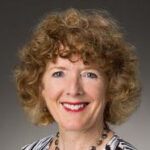RESG News
Additional information regarding the Radiation Effects Committee (REC), Radiation Effects Steering Committee (RESG), and NSREC and NPSS Awards can be found at http://ieee-npss.org/technical-committees/radiation-effects/.

Kay Chesnut
Executive Chair

Heather Quinn
Executive Vice-Chair
The purposes of the Radiation Effects Committee (REC) of the IEEE Nuclear and Plasma Sciences Society are to advance the theory and application of radiation effects and its allied sciences, to disseminate information pertaining to those fields, and to maintain high scientific and technical standards among its members.
The Committee aids in promoting close cooperation and the exchange of technical information among its members. This is done by running conferences for the presentation and discussion of original contributions, assisting in the publication of technical papers on radiation effects in the IEEE Transactions on Nuclear Science, coordinating development of radiation effects measurement definitions and standards within IEEE and other standards organizations, providing a sounding board for radiation effects specialists, providing for the continued professional development and needs of its members, and providing liaisons between IEEE and other technical organizations in the areas of radiation effects.
Each year, the REC provides a forum for the technical exchange of information by holding the Nuclear and Space Radiation Effects Conference (NSREC). The NSREC is an international forum for presentation of research papers on nuclear and space radiation effects. This includes effects on electronic and photonic materials, devices, circuits, sensors, and systems, as well as semiconductor processing technology and design techniques for producing radiation-tolerant (hardened) devices and integrated circuits. Papers presented at the NSREC are submitted for possible publication in the January issue of the IEEE Transactions on Nuclear Science.
NSREC 2023 was held at the Sheraton Crown Center, Kansas City, Missouri. Keith Avery, Air Force Research Laboratory, was chair. Heather Quinn, Los Alamos National Laboratory, is the 2024 Chair, Dolores Black, Sandia National Laboratories, is the 2025 Chair, Philippe Paillet, CEA, is the 2026 Chair and Jonathan Pellish, NASA GSFC will be the 2027 chair.
Papers presented at the 2024 NSREC are eligible for publication in the January 2025 issue of the IEEE Transactions on Nuclear Science. Authors must upload their papers prior to the conference for consideration for publication in the January TNS Special Issue. Detailed instructions can be found at NSREC – IEEE Nuclear & Space Radiation Effects Conference.
Keep visiting our web site NSREC – IEEE Nuclear & Space Radiation Effects Conference for author information, paper submission details, exhibitor links, on-line registration, and the latest NSREC information.
ARE YOU A MEMBER OF IEEE?
Now is the time to join the Institute of Electrical and Electronics Engineers (IEEE) and the Nuclear Plasma Sciences Society (NPSS). Why? First, you’ll become a member of the largest professional engineering society in the world. About 60% of NSREC attendees are IEEE members. Full membership in IEEE costs less than $200. IEEE members receive access to a broad range of benefits, including a terrific insurance program, on-line access to IEEE publications, and reduced rates at all IEEE sponsored conferences, including, of course, the IEEE NSREC and Short Course!
NPSS membership is $35. NPSS members receive a free subscription to NPSS News, and free on-line electronic access via IEEE Xplore to the IEEE Transactions on Nuclear Science (TNS) and the NSREC Data Workshop Record. Now members can search and view digital copies of all IEEE TNS papers on-line all the way back to the first IEEE NSREC in 1964. NPSS members get to vote in our NSREC elections, held at the annual open meeting on Thursday of the conference.
Why wait? Apply for membership at http://ieee-npss.org/why-join-npss-and-ieee/ or visit the IEEE registration desk at the NSRE conference.

